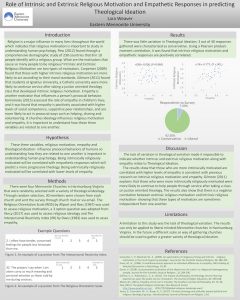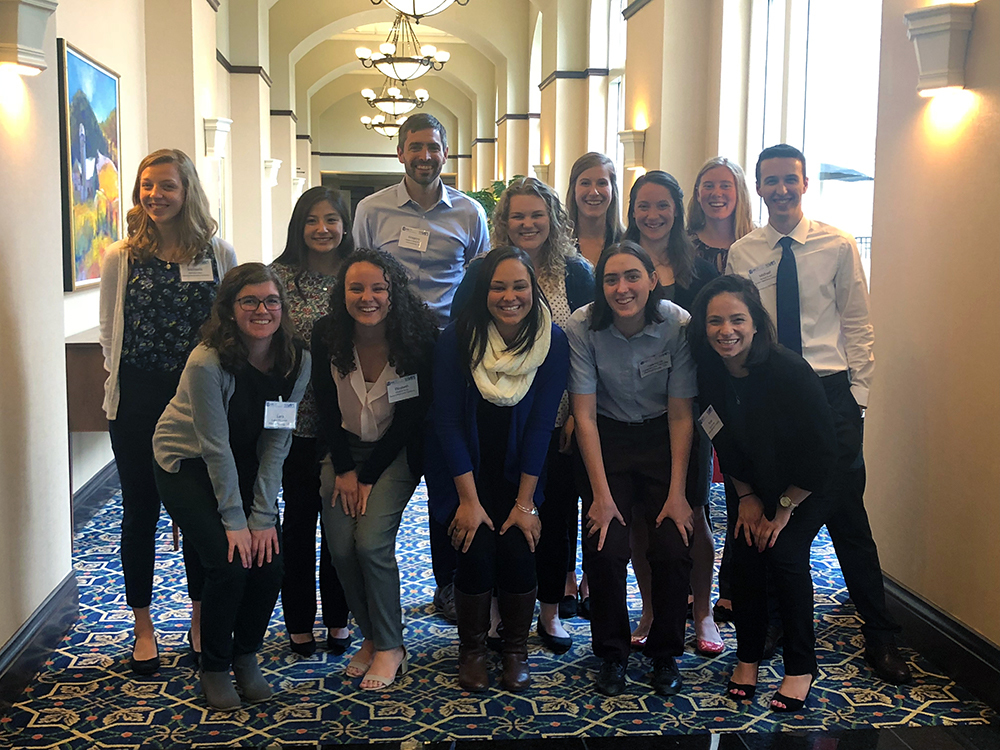In part stemming from her travels to Asia, Eastern Mennonite University senior Lara Weaver has always been fascinated by the ways religion motivates and influences people. So when Professor Gregory Koop encouraged students in his two-semester applied psychology research class to investigate topics they felt personally drawn to, she took the bait – and won.
Weaver’s poster about her research received the student poster award at the Virginia Association for Psychological Science annual convention in Roanoke in April.

Titled “The role of religious motivation and empathy in predicting theological ideation,” it explored how religious ideation is correlated with empathy and religious motivation, and gave her results that she said were “pretty cool to see.”
Winning “felt good, for sure,” Weaver said – and added that her classmates’ work was also outstanding, in part thanks to the “countless hours” of review and input from Koop.
“He made sure we spent a lot of time proofreading and critiquing them,” she said. “All of our research stood out. We had put a lot of time into them because we each had a personal tie to our research.”
Her senior classmates and their projects were:
- Michael Austin: “Directed forgetting: Examining accounts through negative priming”
- Liza Brenneman and Liz Resto: “Test anxiety: Expressive writing as a priming intervention”
- Hannah Cash: “Effects of art making among college students”
- Cela Hoefle: “Visibility and attitudes towards transgenderism within Thai and U.S. undergraduates”
- Jasmine Johnson: “How pre-performance routines enhance performance in individuals participating in sports activities”
- Maisie Kirkley: “The effects of reporting study hours on academic performance”
- Michaela Mast: “The brain on music: An inquiry of shared music-color associations”
- Lydia Musselman: “Do we remember emotional material better?”
- Rose Persinger: “Self-objectifying environments affect one’s mood and self-esteem”
- Emma Stutzman: “Can anger make you happy? Examining desired emotions and well-being”
Research strength
Original research projects introduce every student to “the ins and outs of scientific inquiry,” said department chair Kim Brenneman – and an added strength of the psychology program at EMU is that all students have the opportunity to conduct individual research on a topic related to their unique interests.
The senior research course cultivates a broad background in the field of psychology for students, who by their senior year have fulfilled prerequisites of general, developmental, social and cognitive psychology, as well as a course on interpersonal relationships among others, Koop said. They all have been introduced formally to the research process in the cognitive psychology class, where each student formulates a research proposal.
For Weaver, that proposal took her into the minds of Mennonite church-goers in Harrisonburg.
Weaver’s research

Previous research, as described by Weaver on her poster, suggested that people whose religious motivations are intrinsic are more likely to act on their morals than are people whose religious motivations are extrinsic, say from social or family influences. Similarly, empathy is associated with greater tendency to act in socially supportive ways.
But would religious ideation be connected with empathy and religious motivation? Weaver hypothesized that intrinsic religious motivation would correlate with greater empathy and predict “a more progressive theology,” while extrinsic religious motivation would correlate with less empathy.
To assess the variables in her subjects, Weaver sent three-part surveys to 30 randomly selected members of each of four Mennonite churches in Harrisonburg, two she identified as conservative and two she identified as progressive.
However, she said, only three people from the conservative churches responded (37 responded from the two progressive churches). Therefore, she reported on her poster, “the lack of variation in theological variation made it impossible to indicate whether intrinsic or extrinsic religious motivation along with empathy relate to theological ideation.”
Her results did suggest, however, that “those who are more intrinsically motivated are correlated with higher levels of empathy.”

Excellent!